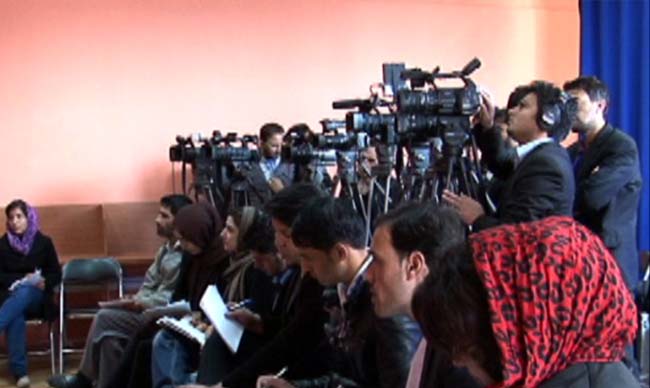In spite of the media’s rapid growth since the fall of the Taliban in 2001, Afghan journalists and editors have been facing serious threats and challenges imposed by insurgent groups while the local authorities, the military and police are also contributing to the climate of fear for media personnel. As a result, Journalists in Afghanistan work under extremely difficult circumstances and routinely face violence, threats, and intimidation that prevent them from carrying out their work. According to Nai, a supporting open media organization, 377 violence cases are recorded against journalists in the past 10 months of 2016, which are equal to all cases documented in the past eight years.Nai, on Sunday said that violence against journalists has hit a new record in the past ten months, which is equal to the figure of violence taken place in all eight past years across the country. Executive Chief of Nai, Sediqullah Tawhidi added that annually they have recorded averagely 48 cases of violence against journalists in the past 15 years, but this year violence drastically increased against journalists. He called on government and international community to take serious measures in order to prevent violence against journalists across the country.
As many as 96 journalists and staffs of media in Kunduz, 75 in Helmand, 108 in Farah and 13 in Uruzgan coerced to left their duty, due to threats dominating in the their cities, he claimed. Pointing to different violence cases including 13 murder cases, Tawhidi said that still no prosecution taken place in this regard to be acceptable and accordance to expectation. Despite of acceptance of journalists’ regulation by National Security Council and establishing of coordination committee between journalists and government, we were not witness for decreasing of violence against journalists, he noted. He said that although president recently released a decree regarding access of journalists to information, but we were not witness to see any positive changes yet. Situation got worse day by day for journalists this year, he asserted. Additionally, In Nili, the capital of the Daikundi province, a homemade bomb attack on Radio Nasim on the night of October 11, 2016 caused considerable damage but no injuries, station manager Mohammad Reza Vahedi reported. While a few hours before the bombing, two unidentified men went to Vahedi's home, threatened him and beat him, he added.
One more example in Zabul province, despite repeatedly request regarding prosecution, still no steps has been hold to bring perpetrators before justice. Terrorist groups, governmental officials’ particularly provincial officials, private sectors including protestors said to be the main factors behind violence against journalists throughout the country. Journalist from Zabul complains of violence against journalists in Zabul province. Unveil challenges in the governmental organs in the province by journalists are said to be the main reason behind most violence against reporters. It is also said that Journalists not afraid of Taliban and other terrorist groups, but from governmental officials in Zabul province. Recently Ahmad Wali Sarhad, a freelancer working for the Zabultimes website, who was harassed for months by the police. His problems began when the Zabul prosecutor's office issued a warrant for his arrest after he wrote that a transport ministry official was probably collaborating with the Taliban. He blamed the harassment on the governor, although the governor's office denied any role in the case.
Another study conducted by Afghanistan National Journalist's Union (ANJU) reveals that government has not investigated 70 percent of violence, murder and harassment cases against journalists and 70 percent of media personnel are not satisfied with government's activities to prevent the issue. The survey was carried out in 11 provinces, interviewing 1,088 journalists and media workers. The survey also speaks of gender-based discrimination and states that 30 percent of women journalists and media workers were mistreating at workplace and out of office due to gender issues."Nearly 30 percent of women interviewed in the survey have said they have witnessed discrimination and harassment inside and outside office," Dashti said. In addition to security issues, a number of journalists complain that they have low access to information provided by government offices.
The increase of violence in several provinces has again fuelled tension and frustration between journalists and civil society. As many governors and local officials do not respect journalistic independence. Journalists have been harassed or come under attack by local officials, their bodyguards, police officers and the Taliban in several provinces including Mazar-e-Sharif, Kandahar, Herat, Ghazni and Kabul. The police and judicial authorities, who are susceptible to being influenced by governors, often interrogate and even punish journalists.
These waves of violence and complains come after approval of access to information law caused new hopes for journalist and other citizens as a great step towards democratic development in Afghanistan.
In democratic system, media considered as the fourth pillar; According to international conventions to which Afghanistan is a signatory and according to Article 50 of the Afghan Constitution, “Right to Know” or “Right of Access to Information” is a fundamental human right for every Afghan citizen. It can play an important role in the fight against corruption and the right to access information increases transparency, accountability, public participation and democracy development.
So, it is expected that human right organizations and local citizens strongly support media and journalist to monitor social, political or administrative issues or else a nation of sheep will beget a government of wolves.
Home » Opinion » New Wave of Violence Against Journalist
New Wave of Violence Against Journalist
| Mohammad Zahir Akbari

